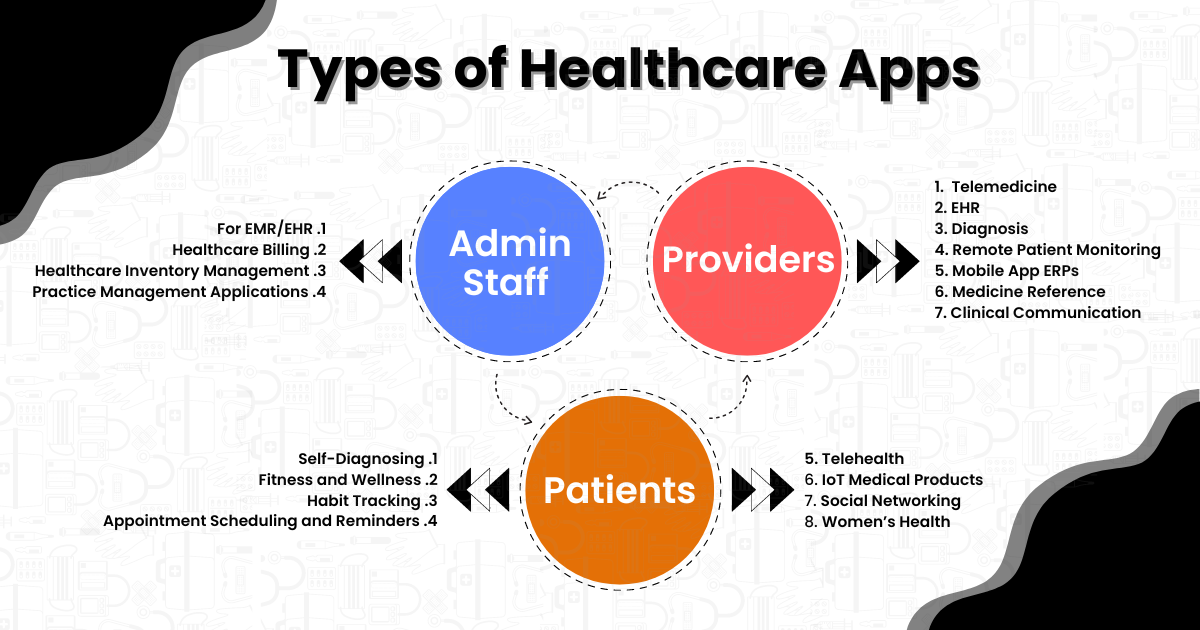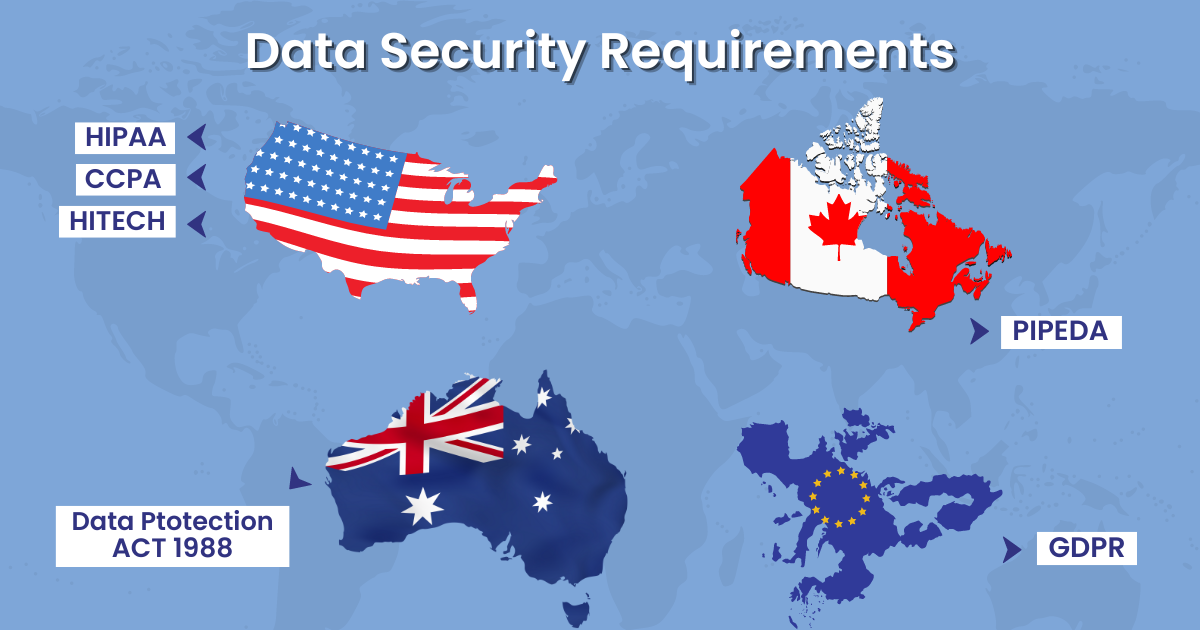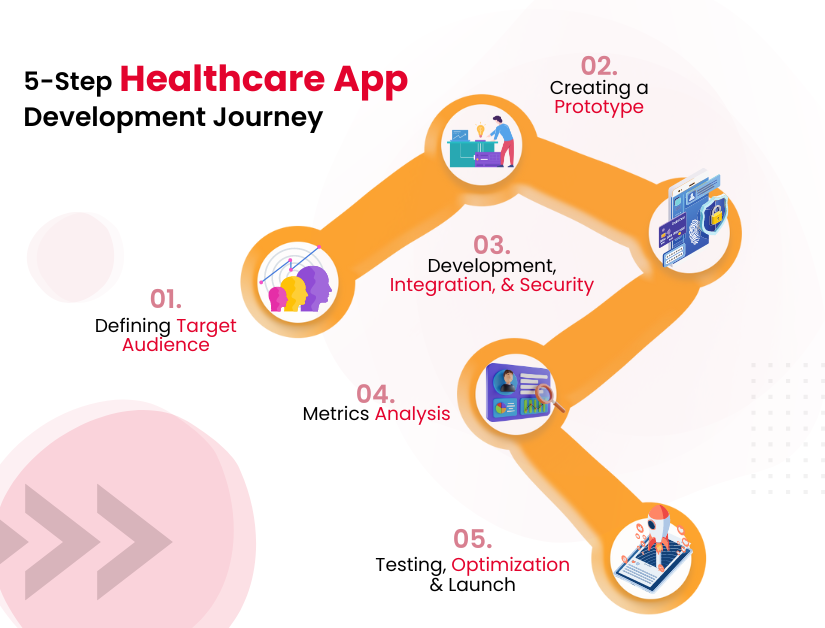Mohit Bhatt
Webguruz Technology Pvt. Ltd.

Healthcare has witnessed a significant transformation due to the advent of technology. One of the most remarkable advancements that have contributed to this is the development of healthcare apps.
Healthcare apps are software programs that perform tasks such as sending reminders about taking medicine, keeping patients and their caretakers up to date about recent advancements, educating them about healthcare topics, and enabling patients to record health-related data by taking regular measurements. These apps can be used on smartphones and tablets, etc. Other IoT devices like smartwatches and wearables also support certain healthcare apps and can be used to track health-related information. From monitoring vital signs to scheduling doctor appointments, healthcare apps have made healthcare services more accessible and convenient. In fact, they have revolutionized the way we access and manage our health-related information.
There is a whole range of healthcare apps catering to three main audiences: Patients, Providers, and Administration Staff. Now, there are different types of apps based on their functionality within each of these categories.

So, there are a lot of options to choose from when you are looking to build a healthcare app in 2023.
Healthcare app development has numerous benefits for both healthcare providers and patients. Here is a closer look at some of them:
Healthcare apps provide users with 24/7 access to medical information, allowing them to conveniently schedule appointments, access test results, and communicate with healthcare professionals.
With healthcare apps, patients can actively participate in their healthcare journey. They can set reminders for medication, track their health parameters, and receive personalized health recommendations.
Healthcare apps enable users to monitor their vital signs such as heart rate, blood pressure, and glucose levels. This real-time data can be shared with healthcare providers for accurate diagnosis and treatment planning.
Healthcare apps facilitate secure and seamless communication between patients and healthcare providers. Users can engage in virtual consultations, seek advice, and clarify doubts without physical visits, thereby saving time and effort.
The rising importance of mental health has led to the development of mental health apps. Mental Health App Development can help you get apps that offer meditation techniques, stress management tools, and access to licensed therapists, promoting overall mental well-being.
Unlike entertainment or other apps, healthcare-related apps go through stringent approval processes. Since the app is related to the medical niche, it should meet the HIPAA guidelines, comply with the GDPR standards and match the privacy and security regulations depending on the market you are looking to target.
HIPAA guidelines apply to any medical software that records, stores, and distributes healthcare-related information. And, if you are targeting the American market, you will need to ensure that your app meets the same.
GDPR standards, on the other hand, are applicable to all software that’s being launched in the European Union. Introduced in 2018, these rules govern the collection, storage, and use of personal data by all software.

In addition to these laws, there are some other regulations as well. To name a few, there is the PIPEDA in Canada, and DATA Protection Act in the UK. Furthermore, there are Apple’s Human Interface Guidelines for CareKit and HealthKit, Android.os.health documentation, IEC 62304, ISO27001, SOC2 Type 2, MFi Program, HITECH Act, and other standards as well.
All of these laws and regulations are dedicated to safeguarding a person’s confidential information against unwarranted usage, storage, and distribution. Creating an app in line with the applicable data security laws is critical to ensuring approval and a seamless launch.
Another crucial point is creating a safer payment interface. A PCI SSC organization can assist with complying with the required aspects and receiving a license so you can proceed with the licensing easily.
In order for your healthcare app development efforts to succeed, you will need to ensure that it has features to engage users and offer tangible benefits. You can decide which features to add based on the purpose behind creating the healthcare app. Choose whether you want to build a mobile medical solution for fitness, glucose tracking, or patient monitoring, and accordingly work on integrating essential features.
Here are some basic features that every health app must have:
Integrations
Medical apps have to deal with patient data on a regular basis. From storing confidential health-related data and transferring it to other medical systems to saving payment-related information, there needs to be a place to integrate everything. And services like HealthKit, Samsung Health, and Google Fit help in just that manner.
User Profiles
Data saved in the app should be organized in the form of user profiles that should be editable at every point. Doctor and Patient profiles must include sufficient information about them so both of them can navigate through the complex decision-making and medical service landscape easily.
Telemedicine
Modern healthcare apps should have the feature to connect patients with healthcare providers in real time. This will help them connect with providers remotely and seek medical advice remotely. This is particularly helpful for bedridden and specially-abled patients.
Reminders
Mobile apps excel at keeping patients up-to-date on medical prescriptions and medicine consumption schedules. By sending alerts and notifications that are not just time but location-based, these features in health apps can prove really helpful.
Compliance
Personal health information and medical data must be kept secure at all times. This is why all such apps must be created in line with regional data privacy and protection laws like HIPAA, GDPR, PIPEDA, and Data Protection Act, etc. The team at Webguruz ensures that the entire healthcare app development process is carried out in line with data privacy and protection regulations.
Health Monitoring
These apps focus on tracking and monitoring vital health parameters such as heart rate, sleep patterns, calorie intake, and exercise routines. They can synchronize with wearable devices and provide detailed analytics and personalized insights.
If you Google the phrase, you will get different responses based on your requirements and the features you wish to add to the same. More the features, the higher the cost. In order to determine the final cost of a healthcare app, you will need to determine the requirements which might include Front End and Back End Developers, DevOps, Business Analysts, Compliance Experts, UI/UX Experts, Quality and Testing Experts, etc.
Each of these services has a cost associated with it. In general, the costs associated with the development alone can cost you anywhere between $50,000 – $120,000. If you are looking for a collective estimate including testing, deployment, and post-development support, the costs may rise even more.
The healthcare app development process entails the following steps:
This phase involves thorough research and planning to define the app’s objectives and target audience. Identify the specific healthcare needs that the app aims to address and understand the existing market landscape.
Conduct market research and competitor analysis to identify gaps and opportunities. Define the app’s unique selling propositions and create a comprehensive plan that outlines the app’s features, functionality, and overall roadmap.
In this phase, the focus is on designing the app’s user interface (UI) and user experience (UX). Create wireframes, which are basic visual representations of the app’s layout and functionality. Design the UI elements, screens, and navigation flow to ensure a seamless user experience.
Consider usability principles, accessibility guidelines, and branding requirements while designing the app. Collaborate with UI/UX designers to create visually appealing and intuitive designs that align with the app’s objectives and target audience.
Once the design phase is complete, the development process begins. Skilled developers use programming languages and frameworks suitable for the app’s target platforms (such as iOS and Android).
Implement the planned features and functionality, including appointment scheduling, health data integration, secure communication channels, and user authentication. Adhere to coding best practices, maintain clean code, and ensure scalability and performance optimization during the development process.

This phase focuses on ensuring the app functions flawlessly across different devices, operating systems, and scenarios. Conduct comprehensive testing to identify and fix any bugs or issues. Test for functional correctness, performance, security vulnerabilities, and compatibility.
Utilize various testing methodologies such as manual testing and automated testing to ensure the app meets the highest quality standards. Involve a dedicated quality assurance team to conduct rigorous testing and ensure a robust and error-free healthcare app.
Once the app has passed all testing stages, it is ready for deployment. Prepare the app for submission to relevant app stores, such as the Apple App Store and Google Play Store. Follow the guidelines and procedures provided by each app store to ensure a smooth submission and approval process.
Ensure compliance with regulatory requirements, such as HIPAA, to maintain the security and privacy of user data. Prepare marketing materials, including app descriptions, screenshots, and promotional assets, to maximize the app’s visibility upon launch.
After the app is launched, the work doesn’t stop. Continuous maintenance and updates are crucial for the long-term success of the healthcare app. Monitor user feedback, reviews, and analytics to identify areas for improvement and address any bugs or issues that arise.
Regularly release updates to introduce new features, enhance usability, and improve security. Stay up to date with the latest industry trends and technological advancements to ensure the app remains relevant and competitive in the ever-evolving healthcare landscape.
When looking to build a healthcare app that helps users get access to their medical information, you’ll want to work with a reliable healthcare app development company. But, finding one is where most prospects would go wrong. Here are some tips to help you find a reliable medical app development partner to work with:
Look for a company that specializes in healthcare app development. Verify their track record and experience in developing similar apps. Consider their portfolio and case studies to assess the quality and functionality of their previous projects. A company with domain expertise will have a better understanding of healthcare regulations, security requirements, and industry-specific challenges.
Compliance with healthcare regulations, such as HIPAA (Health Insurance Portability and Accountability Act), is paramount when handling sensitive patient data. Ensure that the app development company has a deep understanding of these regulations and adheres to the necessary compliance standards. A reputable company will prioritize data security, encryption, and privacy to protect patient information.
Assess the company’s technical capabilities and expertise. Look for a team with experience in developing robust, scalable, and secure mobile and web applications. Consider their proficiency in relevant technologies, programming languages, frameworks, and platforms (iOS, Android, etc.). Additionally, inquire about their ability to integrate with external systems like electronic health records (EHR) or wearable devices. An innovative approach to technology and the ability to leverage emerging trends can set a company apart from the competition.
A well-designed healthcare app should prioritize user experience. Evaluate the company’s UX design capabilities by reviewing their previous app interfaces and evaluating their usability. The app should have an intuitive and user-friendly interface that caters to the specific needs of your target audience. Look for a company that incorporates user-centered design principles, conducts usability testing, and focuses on creating engaging and visually appealing interfaces.
Clear and effective communication is vital for a successful app development project. Assess the company’s project management methodologies and communication practices. A company that follows an agile development approach can ensure transparency, collaboration, and timely delivery. Regular updates, progress reports, and frequent communication will help you stay informed about the project’s status and make necessary adjustments if needed.
Request client references or check for testimonials from previous clients. Reach out to their clients and inquire about their experience working with the app development company. Ask about the company’s professionalism, responsiveness, adherence to timelines, and the quality of the delivered product. Feedback from previous clients can provide valuable insights into the company’s capabilities and client satisfaction levels.
A healthcare app requires ongoing support and maintenance even after its launch. Inquire about the company’s post-development support and maintenance services. Understand their approach to bug fixes, updates, and enhancements. A reliable app development company will provide timely support, ensure regular updates to address any issues and stay available to assist with future enhancements or feature additions.
While cost shouldn’t be the sole determining factor, it’s important to consider the budget and timeline for your project. Discuss the project requirements with the app development company and obtain a detailed proposal outlining the estimated costs, development timeline, and payment terms. Compare these proposals from different companies while considering their expertise and the value they bring to the table. The team at Webguruz can help you get a Healthcare app made at affordable prices.
Healthcare apps are software programs that can help patients, providers, and the other hospital staff conduct a variety of medical activities including medication administration, monitoring, maintaining a medical schedule, recording health-related data, educating about good health practices, and more. These apps can be used on a smartphone and other IoT devices like wearables, etc.
Creating a healthcare app is a process that involves multiple steps. From in-depth market analysis to identifying the audience, choosing the app type you wish to develop, working on the UI/UX part, making it secure, testing the app, and the final launch, there’s a whole sequence of steps that are involved in the healthcare app development process.
The cost of developing a basic native healthcare mobile app may anywhere be between $50,000 and $80,000. If you are looking to create a cross-platform healthcare app, with several features, it may cost upwards of $150,000 or more. When you add the app design services, different forms of testing, and other things, the cost can again rise substantially to upwards of $300,000.
A general Google Search will leave you with a plethora of Healthcare Mobile App Development Services providers. However, with an in-depth look at the services and value they have to offer, you can easily guess which ones to work with. Webguruz Technologies have expertise in both native and cross-platform mobile app development services. We can help you build interactive healthcare apps at an affordable price.
Designing a mobile health app in general is subject to a variety of stringent regulations and approval processes. From defining the app’s objective to creating user personas, developing the entire information architecture, wireframing, prototyping, Usability testing, accessibility considerations, and improvements based on user feedback and behavior, there’s a lot that goes into the healthcare app design process.
In essence, designing a mobile health app involves creating a balance between functionality, usability, aesthetics, and user needs. If you need help with the app design process, the team at Webguruz can help you.
Healthcare Web Application Development and Mobile app development can help you in a myriad of ways. Here is a brief take on the benefits that a typical healthcare app can bring along:

Mohit Bhatt
2025-01-22
7 min read
The advertising world is evolving, and with 2025 on the horizon, digital marketing is entering an era shaped by advanced technologies.
Read More >
Mohit Bhatt
2025-01-22
7 min read
Migrating to HubSpot CMS is a pivotal step for businesses seeking a seamless, scalable, and user-friendly content management system.
Read More >
Mohit Bhatt
2025-01-20
7 min read
Establishing an online presence is crucial for businesses, including coffee shops. With customers constantly seeking out new places to enjoy their favorite cup of coffee, ensuring your coffee shop stands out in the online space is essential.
Read More >Drive more leads, maximize your RoI, and grow your business with digital solutions built specifically for your business.
Sales - (+91) 730 700 1777
Jobs - (+91) 959 201 6444
Sales - provider@webguruz.in
Jobs - careers@webguruz.in

4th Floor, SM Heights, C-205, Phase 8 B, Sector 74 Mohali

11 Rydons Lane, Coulsdon, CR5 1SU, UK

6917 Hovingham Court Centreville va 20121

31 Newmarket Parade, Mickleham, VIC, 3064,Australia